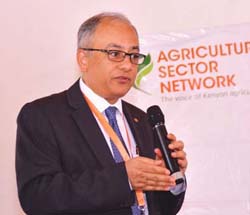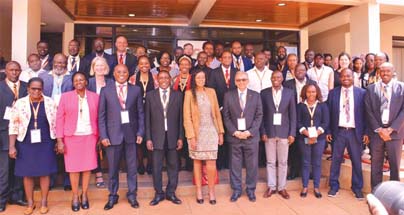The 2nd National Agriculture Summit 2022
By Mary Mwende Mbithi

Daniel Webster, a lawyer and statesman from the United States of America, once said, “Let us not forget that the cultivation of the earth is the most important labour of man. When tillage begins, other arts will follow. The farmers, therefore, are the founders of civilization.” True to that, agriculture has or rather was man’s early way of life. Agriculture has sustained the globe over the years, providing food as well as employment. It is indeed the cornerstone of all industries.
Recently, the 2nd National Agriculture Summit took place at the Kenya Agricultural Livestock and Research Organisation (KALRO) in Loresho, Nairobi. Agriculture Sector Network (ASNET), together with the ministry of Agriculture, Kenya Private Sector Alliance (KEPSA) and all Agriculture stakeholders held discussions on what should be done for agriculture to become more profitable.
Under the theme, ’Accelerating Private Sector investment in agriculture for growth and transformation, the two-day summit aimed at identifying opportunities to boost productivity and sustainability across all agricultural value chains.
The summit brought together different stakeholders and experts drawn across the divide. Among them was CAS Agriculture Lawrence Omuhaka who was sitting in for CS for agriculture, Livestock and Fisheries Peter Munya. He gave an assurance of government’s support in order to attain food security in the country. He noted that one of the hurdles faced by Kenya currently is the high cost of production. He therefore assured of measures being to lower the cost of feeds.
Reading CS Munya’s message, he said, “Transforming the agriculture sector will provide the tools to combat price and volatility, improving the environment for private investment, and developing more strategic approaches to bring down the country’s dependence on food imports.”
According to Jane Ngige, Vice Chair ASNET, While enumerating the achievements made by ASNET since its inception, she said, agriculture is not only the backbone of Kenya but also the largest source of Kenya’s Gross Domestic Product (33%), employing more than 40% of the total population with 80% as rural population and accounts for over 65% of all export earnings. It provides livelihoods to more than 80% of the population in Kenya.
“We need to re-define the role of the small-scale farmer and the SME agro processor in their contribution to the economy. We are pushing for the allocation of at least 10% of the national budget to Agriculture since the sector contributes about 33% of the country’s GDP and accounts for 80% of national employment, mainly in the rural areas,” She noted.
During the summit, PS state Department of livestock, PS Harry Kimtai also affirmed of government’s partnership with ASNET to streamline agribusiness policies in the country.
This comes at a time when the Agriculture sector is reeling with reduced growth and already facing the adverse effects of the global food crisis especially the surging costs ofliving which in turn are aggravating the cost doing business by SMEs. Ms. Agatha Thuo, ASNET’s General Manager, reiterated on the need for the government to provide an enabling environment and focus on the role of SME’s.
With all these bottlenecks, still the agriculture sector’s overall market value of agricultural production went up by 4.3% from Ksh 505.3 billion to Ksh 527.0 billion in 2021 according to a 2022 economic survey. Dr. Bimal Kataria, the chair of ASNET and Director of Elgon Kenya, in his own words emphasized on the need for a united, innovative and proactive approach that cuts across the value chain.
He went on to say that, a firm industry cannot manage on its own without a sane policy framework and timely government interventions in key areas that support private sector to deliver. Highlighting thechallenges faced by the agriculture sector Dr. Bimal spoke of the setbacks that were brought about by Covid-19 pandemic after most countries imposed curfews and lockdowns in a bid to curb the spread of the virus.
Again the escalation of the war in Ukraine has caused inconveniences to the farmers with the costs of farm input like fertilizer soaring. This clearly translates to farmers risking and planting without fertilizers due to unaffordability.
He therefore urged the government to subsidize the fertilizer in a bid to make it easier for the private sector to supply the sector. “We’ve worked hard with the government to bring down some of the taxes that have been imposed on agricultural inputs. The government has been responsive on the matter and we hope to see changes soon.”
There is a shortage of Maize and Wheat due to the war in Ukraine. Thirty percent of Kenya’s wheat comes from Ukraine. “We are taking mitigating factors asking the government to give us a waiver of duty on maize and wheat. There’s a slight amendment that we are waiting for, that’s the treasury to make it 99.1% non-GMO maize and wheat which will allow us to import from places like Latin America.”
Others in attendance included, Ms. Flora Mutahi – Chair, KEPSA, , Mr. Victor Ogalo – Deputy CEO – Business, KEPSA; Dr. Wilson Songa – Director, ASNET; Mr. Tito Arunga – Head of Agribusiness, Food & Agriculture Organization (FAO); Mr. Mucai Kunyiha – Chair, KAM & KEPSA Director; Arch. Lee Karuri – KEPSA Trustee; Ms. Waithera Gaitho – Vice-Chair, KEPSA ICT & Youth Sector Board among others who joined both physically and virtually.
